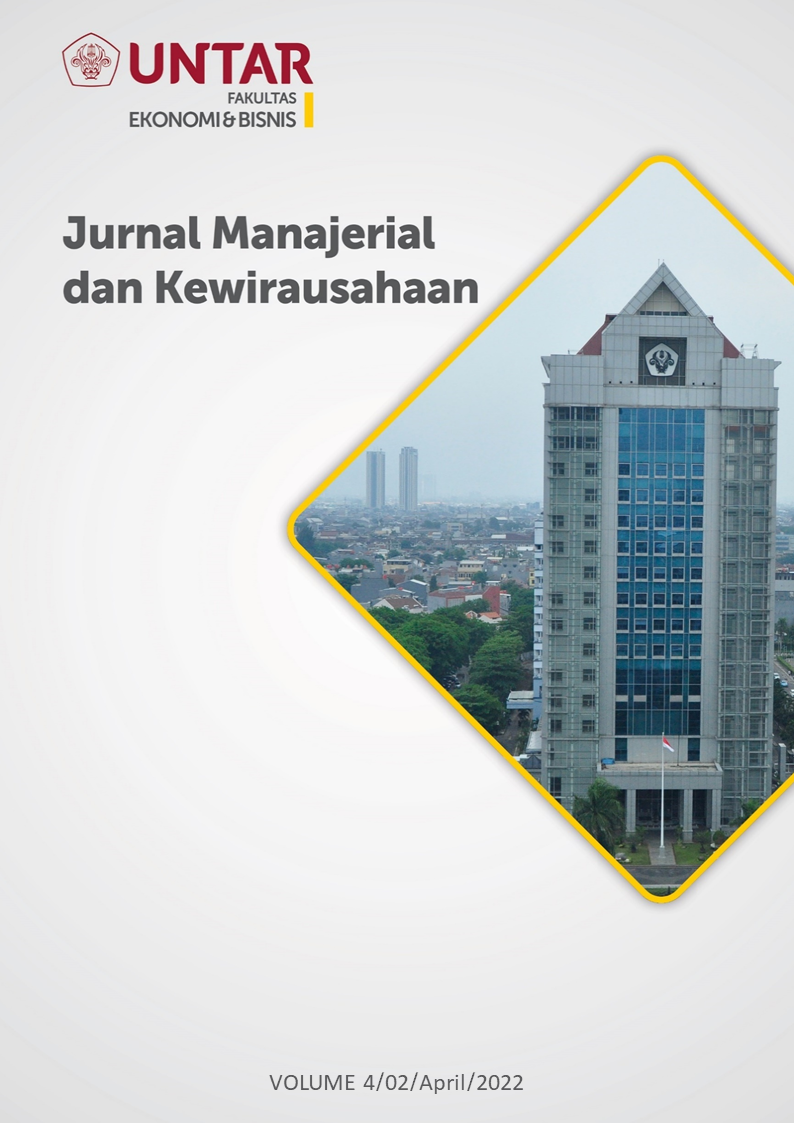Pengaruh Pendidikan Kewirausahaan, Empati dan Dukungan Sosial terhadap Intensi Berwirausaha Sosial Mahasiswa
Main Article Content
Abstract
Tujuan dari penelitian ini adalah untuk mengkaji serta menganalisis pengaruh dari pendidikan kewirausahaan, empati dan dukungan sosial terhadap intensi berwirausaha sosial mahasiswa perguruan tinggi di daerah Jakarta Barat. Pengambilan sampel penelitian ini dilakukan dengan metode probability sampling yaitu simple random sampling dan pengumpulan data dilakukan dengan kuesioner. Sampel penelitian ini adalah 155 responden yang menempuh pendidikan di perguruan tinggi di Jakarta Barat. Penelitian ini menggunakan SmartPLS 3.2.9 dalam mengolah data yang terkumpul. Hasil penelitian ini menemukan bahwa empati dan dukungan sosial memiliki pengaruh yang positif dan signifikan terhadap intensi berwirausaha sosial mahasiswa, sedangkan pendidikan kewirausahaan tidak memiliki pengaruh yang positif dan signifikan terhadap intensi berwirausaha sosial mahasiswa.
The purpose of this study is to examine and analyze the effect of entrepreneurship education, empathy and social support on the social entrepreneurial intentions of West Jakarta university students. The sampling of this research is collected with a probability sampling method, which is simple random sampling and the data collected by questionnaire. The sample of this research is 155 respondents who studied in university at West Jakarta. This study uses SmartPLS version 3.2.9 to processing the collected data. The results of this study find that empathy and social support have a positive and significant effect on students’ social entrepreneurial intentions, whereas entrepreneurship education has a negative and insignificant impact on students' social entrepreneurship intentions.
Article Details
This work is licensed under a Jurnal Muara Ilmu Ekonomi dan Bisnis Creative Commons Attribution-ShareAlike 4.0 International License.,/p>
References
Ali, H., & Faizin, H. (2010). Teologi entrepreneurship. Jakarta: Lembaga Penelitian UIN Jakarta.
Asmani, J. M. M. (2011). Sekolah entrepreneur!. Harmoni.
Ayob, N., Yap, C. S., Sapuan, D. A., & Rashid, M. Z. A. (2013). Social entrepreneurial intention among business under-graduates: An emerging economy perspective. Gadjah Mada International Journal of Business, 15(3), 249-267.
Brief, A. P., & Motowidlo, S. J. (1986). Prosocial organizational behaviors. Academy of management Review, 11(4), 710-725.
Brinker, B. (2021). The role of empathy in social enterprise: why it’s vital to your success!
Blegur, A., & Handoyo, S. E. (2020). Pengaruh pendidikan kewirausahaan, efikasi diri dan locus of control terhadap intensi berwirausaha. Jurnal Manajerial Dan Kewirausahaan, 2(1), 51-61. https://doi.org/10.24912/jmk.v2i1.7424
Chengalvala, S., & Rentala, S. (2017). Intentions towards social entrepreneurship among university students in India. International Journal of Research-Granthaalayah, 5(6), 406-413.
Davis, M. H. (1980). A multidimensional approach to individual differences in empathy. Journal of Personality and Social Psychology.
Eagle, D. E., Hybels, C. F., & Proeschold-Bell, R. J. (2019). Perceived social support, received social support, and depression among clergy. Journal of Social and Personal Relationships, 36(7), 2055-2073.
Fishbein, M., & Ajzen, I. (2005). Theory-based behavior change interventions: Comments on Hobbis and Sutton. Journal of health psychology, 10(1), 27-31.
Hockerts, K. (2017). Determinants of social entrepreneurial intentions. Entrepreneurship Theory and Practice, 41(1), 105-130.
Idris, M. (2021). Jumlah penduduk indonesia terkini mencapai 271,34 juta. Retrieved from Kompas.com: https://money.kompas.com/read/2021/01/22/090554926/jumlah-penduduk-indonesia-terkini-mencapai-27134-juta?page=all
Jadmiko, P. (2020). Minat berwirausaha sosial dikalangan mahasiswa. Jurnal Manajemen Bisnis, 17(3), 445-456.
Lacap, J. P. G., Mulyaningsih, H. D., & Ramadani, V. (2018). The mediating effects of social entrepreneurial antecedents on the relationship between prior experience and social entrepreneurial intent: The case of Filipino and Indonesian university students. Journal of Science and Technology Policy Management.
Mair, J., & Noboa, E. (2006). Social entrepreneurship: How intentions to create a social venture are formed. In Social entrepreneurship (pp. 121-135). Palgrave Macmillan, London.
Mair, J., & Marti, I. (2006). Social entrepreneurship research: A source of explanation, prediction, and delight. Journal of world business, 41(1), 36-44.
Mei, C. C. (2011). The influence of entrepreneurial self-efficacy on entrepreneurial learning behavior-using entrepreneurial intention as the mediator variable. International Business and Management, 3(2), 7-11.
Nathanael, D., dan Nuringsih, K. (2020). Social support, personality traits, social innovation mempengaruhi intensi kewirausahaan sosial: entrepreneurial attitude sebagai mediasi. Jurnal Manajerial dan Kewirausahaan, 2(1), 33-42. https://doi.org/10.24912/jmk.v2i1.7422
Putri, I. S. S. (2018). Analisis intensi kewirausahaan sosial mahasiswa program studi administrasi bisnis. Jurnal Riset Bisnis dan Investasi, 4(2), 28-34.
Slamet, F., Tunjungsari, H. K., dan Ie, M. (2018). Dasar-dasar kewirausahaan (3rd ed.). Jakarta: PT.Indeks.
Stein, S., dan Book, H. (2002). Ledakan EQ: 15 prinsip dasar kecerdasan emosional meraih sukses. (T. R. Januarsari, Trans.) Bandung Kaifa.
Tran, A. T., & Von Korflesch, H. (2016). A conceptual model of social entrepreneurial intention based on the social cognitive career theory. Asia Pacific Journal of Innovation and Entrepreneurship.



